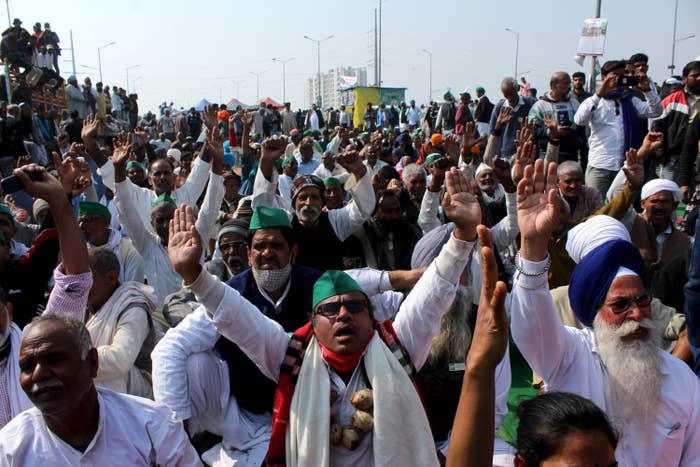
Twitter is striking a defiant note in its struggle with India over restricting accounts in the country. On Monday, the company released its first official response since India’s government demanded it reblock more than 250 accounts it had restored in defiance of an IT ministry order. Among the blocked accounts were Caravan, a news magazine, and people who had criticized Prime Minister Narendra Modi.
“We strongly believe that the open and free exchange of information has a positive global impact, and that the Tweets must continue to flow,” the company said in a statement shared with BuzzFeed News.
Twitter’s statement comes in the middle of a face-off with India’s increasingly authoritarian government as millions of farmers protest agricultural reforms, rocking the nation.
On Monday, reports in the Indian press said that the government had asked the company to block nearly 1,200 additional accounts that it said were tweeting about the protests, and were being run from Pakistan. A report in the Times of India also quoted an anonymous government official saying that India was upset with Twitter CEO Jack Dorsey for liking tweets supporting the protests. A Twitter spokesperson declined to comment.
On Jan. 31, India's IT ministry had ordered Twitter to prevent more than 250 accounts belonging to activists, political commentators, and the Caravan from being viewed inside the country. Twitter initially complied but changed course six hours later. In response, India’s government ordered the site to block the accounts once again and threatened Twitter officials in India with legal consequences for violating the order, including a fine and up to seven years in prison.
But a week later, the accounts are still up, putting the company’s staff in India at risk of government retaliation.
“Safety of our employees is a top priority for us at Twitter,” the company statement said. “We continue to be engaged with the Government of India from a position of respect and have reached out to the Honourable Minister, Ministry of Electronics and Information Technology for a formal dialogue.”
Twitter’s actions put it at the center of a free speech debate in a country that is seeing an ongoing crackdown on dissent amid protests by millions of farmers opposed to agricultural reforms that they say will hurt their incomes. For Twitter, blocking the accounts once again would mean enabling this crackdown, but not restricting them risks legal consequences.
“We review every report we receive from the government as expeditiously as possible, and take appropriate action regarding such reports while making sure we hold firm to our fundamental values and commitment to protecting the public conversation,” Twitter said. “An update is shared through our established channels of communication with the Government.”
Despite the polite language, some people, including former Twitter employees saw a double meaning in the statement. During the Arab Spring in 2011, the company’s cofounder Biz Stone and former general counsel Alexander Macgillivray wrote a post clarifying the company’s position on free speech. It was titled: “The Tweets Must Flow.”
